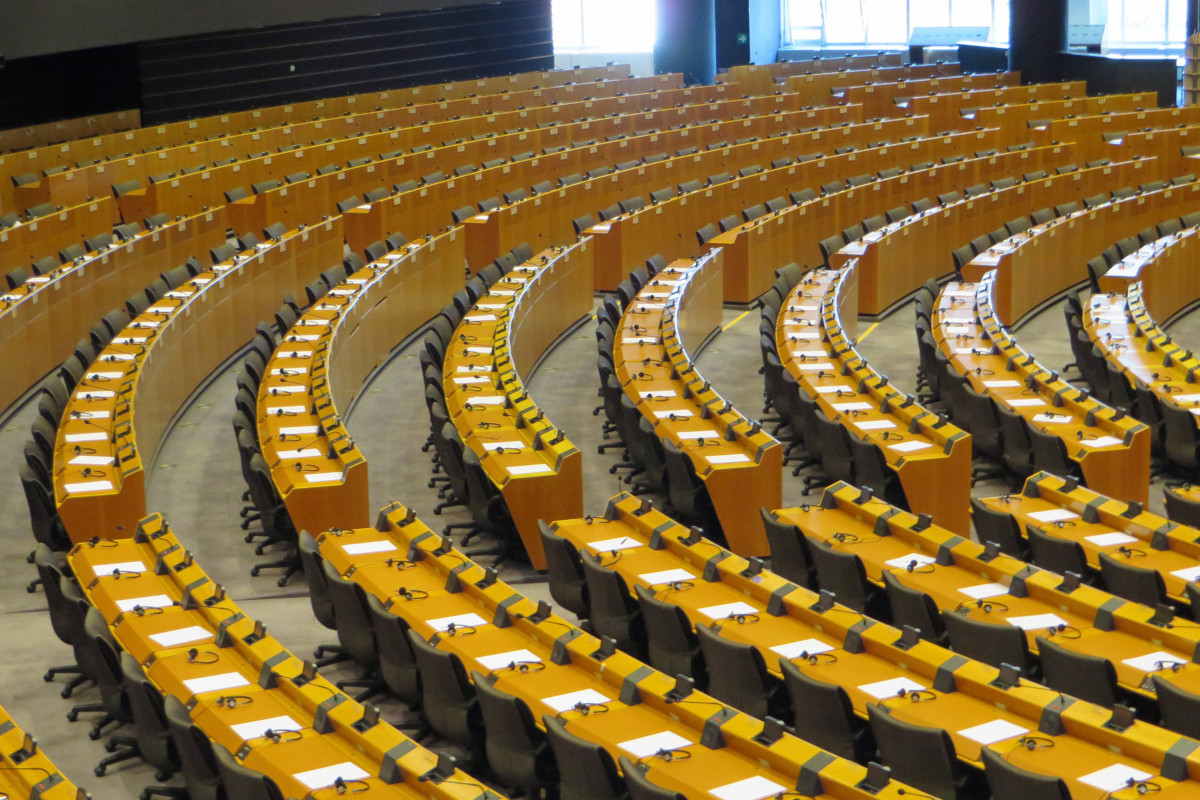Police AI needs strict limits and controls, warn civil society organisations
Topic
Country/Region
20 September 2023
Secret "trilogue" negotiations on the EU's proposed Artificial Intelligence Act are ongoing, and next week MEPs and EU member state representatives will start discussing bans and prohibitions. The week after, decisions are expected on whether to classify the use of AI for migration and security purposes as "high risk" or not. A statement directed at decision-makers and signed by 115 associations and individuals, including Statewatch, calls for strict limits and controls in the AI Act "to prevent harm, protect people from rights violations and provide legal boundaries for authorities to use AI within the confines of the rule of law."
Support our work: become a Friend of Statewatch from as little as £1/€1 per month.

Image: Ivan Vranić, CC BY-NC 2.0
The statement was coordinated by EDRi.
EU policymakers: regulate police technology!
Civil society calls on the EU to draw limits on surveillance technology in the Artificial Intelligence Act
As AI systems are increasingly used by law enforcement, migration control and national security authorities, the EU Artificial Intelligence Act (AI Act) is an urgent opportunity to prevent harm, protect people from rights violations and provide legal boundaries for authorities to use AI within the confines of the rule of law.
Increasingly, in Europe and around the world, AI systems are developed and deployed for harmful and discriminatory forms of state surveillance. From the use of biometrics for identification, recognition and categorisation, to predictive systems in various decision-making and resource allocation capacities, AI in law enforcement disproportionately targets already marginalised communities, undermines legal and procedural rights, and enables mass surveillance.
When AI systems are deployed in contexts of law enforcement, security and migration control (including the policing of social security), the power imbalance between the authorities and the surveilled is even more profound. This means that there is an even greater risk of harm, and violations of fundamental rights and the rule of law.
This statement outlines the urgent need to regulate the use of AI systems by law enforcement, migration control and national security authorities throughout Europe.
We point to the specific dangers to freedom of assembly, liberty, the right to asylum, privacy and data protection, the right to social protection, and non-discrimination when such technology is deployed by those authorities.
Civil society organisations are calling for an AI Act that prevents unchecked forms of discriminatory and mass surveillance. In order to uphold human rights and prevent harm from the use of AI in policing, migration control and national security, the EU AI Act must:
- Include legal limits prohibiting AI for uses that pose an unacceptable risk for fundamental rights. This includes a legal prohibition on different forms of biometric surveillance, predictive policing, and harmful uses of AI in the migration context.
- Provide public transparency and oversight when police, migration and national security agencies use ‘high-risk’ AI, by upholding an equal duty of these authorities to register high risk uses in the EU AI database.
- Ensure that the AI Act properly regulates the uses of AI in policing, migration and national security that pose risk to human rights, specifically the full list of AI in migration control, and ensuring that national security is not excluded from scope.
Why the EU AI Act needs to regulate the use of AI in law enforcement, migration and national security:
- Checks on state and police power are essential to the functioning of a democratic rights-based society. The AI Act is intended to recognise and regulate high-risk uses of AI and, where necessary, prohibit them where the threat to fundamental rights is too great. Uses of AI by state authorities in fields of policing, migration and national security are amongst the most high risk use cases, because they most acutely impact fundamental rights including freedom of assembly and expression, the right to a fair trial, the presumption of innocence, non-discrimination, and the right to claim asylum. The work of police, migration and security authorities governs access to the public space, outcomes in the criminal justice and migration sectors, and various other areas of life with the highest impact on fundamental rights. As such, the use of AI by these authorities calls for the greatest scrutiny and transparency, and requires the clearest boundaries to uphold basic democratic principles.
- The use of AI in the fields of policing, security and migration amplifies structural discrimination against already marginalised and over-surveilled communities, such as racialised people, migrants, and many other discriminated groups. Mounting evidence demonstrates that such AI systems reinforce the over-policing, disproportionate surveillance, detention and imprisonment of structurally discriminated against groups. The data used to create and operate such systems reflects historical, systemic, institutional and societal discrimination. This discrimination is so fundamental and ingrained that all such systems will reinforce such outcomes. Prohibitions, public transparency and accountability frameworks are necessary so that harms are prevented and people are empowered to challenge harms.
- The use of AI in field of policing, security and migration invites private sector influence into core aspects of public governance, requiring even stronger oversight and legal limits in order to ensure peoples’ rights are upheld. As these fields are government functions, it is crucial the AI Act ensures that private sector’s development of AI in these fields is publicly transparent. AI systems, when deployed in areas of policing, migration and national security must be accountable first and foremost to fundamental rights standards and the rule of law, rather than profit motives. As such safeguards, oversight and legal limits must be applied.
Detailed recommendations on how the EU AI Act must be amended in these areas are provided in annex to this statement.
Signed,
- European Digital Rights (EDRi)
- Access Now
- AlgoRace
- Algorights
- AlgorithmWatch
- All Out
- Àltera
- AMERA International
- Amnesty International
- Angela Daly - Professor of Law, University of Dundee, Scotland, UK
- Anita Okoro
- ApTI - Asociația pentru Tehnologie și Internet
- Asia Indigenous Peoples Pact
- Aspiration
- Association for Legal Studies on Immigration (ASGI)
- Association Konekt
- Association of citizens for promotion and protection of cultural and spiritual values Legis Skopje
- ASTI asbl - Association de soutien aux travailleurs immigrés
- AsyLex
- Bits of Freedom
- Bridget Anderson - University of Bristol
- Bulgarian center for Not-for-Profit Law (BCNL)
- Centre for Information Technology and Development (CITAD)
- Centre for Peace Studies
- Chaos Computer Club e.V.
- Chiara De Capitani (PhD, Università degli Studi di Napoli "L'Orientale")
- Civil Liberties Union for Europe
- Comisión General de Justicia y Paz de España
- Controle Alt Delete
- Corporate Europe Observatory (CEO)
- D64 - Zentrum für Digitalen Fortschritt e. V.
- Danes je nov dan, Inštitut za druga vprašanja
- Democracy Development Foundation
- Digital Ethics Center / Skaitmenines etikos centras
- Digitalcourage
- Digitale Gesellschaft
- Digitale Gesellschaft
- Dr Derya Ozkul
- Ekō
- Electronic Frontier Finland
- Elektronisk Forpost Norge (EFN)
- Elisa Elhadj
- works
- Equipo Decenio Afrodescendiente
- Ermioni Xanthopoulou
- Eticas
- EuroMed Rights
- European Anti-Poverty Network (EAPN)
- European Center for Not-for-Profit Law
- European Civic Forum
- European Movement Italy
- European Sex Workers' Rights Alliance (ESWA)
- Exploring Womanhood Foundation
- Fair Trials
- Fair Vote UK
- Francesca Palmiotto Hertie School
- Fundación Cepaim
- German NGO Network against Trafficking in Human Beings - KOK
- Gernot Klantschnig, University of Bristol
- Glitch
- Greek Forum of Migrants
- Homo Digitalis
- Human Rights Association (İHD)
- I Have Rights
- IDAY Liberia Coalition Inc
- Instituto de Asuntos Culturales
- International Commission of Jurists
- International Women* Space e.V
- Irish Council for Civil Liberties (ICCL)
- King's College London
- KISA - Equality, Support, Antiracism
- La Quadrature du Net
- Legal Center for the Protection of Human Rights and the Environment (PIC)
- Legal Centre Lesvos
- Liberty
- Ligue algérienne pour la défense des droits de l'homme
- Ligue des droits de l'Homme (France)
- Ligue des droits humains (Belgium)
- LOAD e.V.
- Lorenzo Vianelli (University of Bologna)
- Mallika Balakrishnan, Migrants Organise
- Migrant Tales
- Mirjam Twigt
- Moje Państwo Foundation
- Mujeres Supervivientes
- Novact
- Open Knowledge Foundation Germany
- Organisation International Federation of ACAT (FIACAT)
- Panoptykon Foundation
- Partners Albania for Change and Development
- Platform for International Cooperation on Undocumented Migrants (PICUM)
- Politiscope
- Privacy First
- Privacy International
- Privacy Network
- Dr. Lorenz Boellinger, University of Bremen
- Jan Tobias Muehlberg (Universite Libre de Bruxelles)
- Promo-LEX Association
- Prostitution information center
- REFUGEE LEGAL SUPPORT
- REPONGAC Réseau des Plateformes Nationales d'ONG d'Afrique Centrale
- Ryan Lutz, University of Bristol
- Sea-Watch
- SOLIDAR & SOLIDAR Foundation
- Statewatch
- Stichting Landelijk Ongedocumenteerden Steunpunt
- SUDS - Associació Internacional de Solidaritat i Cooperació
- Superbloom (previously known as Simply Secure)
- SUPERRR Lab
- Symbiosis - Council of Europe School for Political Studies in Greece
- Taraaz
- Michael Ellison, University of Bristol
- Vicki Squire, University of Warwick
- Victoria Canning - University of Bristol
- Volonteurope
Annex - Detailed recommendations
In order to achieve the calls outlined in the civil society statement ‘EU policymakers – regulate police technology!’, the EU AI Act must:
- Include legal limits prohibiting AI for uses that pose an unacceptable risk for fundamental rights. This includes a legal prohibition on different forms of biometric surveillance, predictive policing, and harmful uses of AI in the migration context.
- A full ban on real-time and post remote biometric identification in publicly accessible spaces (including border areas and around migration detention facilities), by all actors, without exception (Article 5(1)(d));
- A broad definition of of public-accessible spaces, which includes border areas (Reject Recital 9, Council Mandate);
- A prohibition of all forms of predictive and profiling systems in law enforcement and criminal justice (including systems which focus on and target individuals, groups and locations or areas) (Article 5(1)(da) EP mandate);
- Prohibitions on AI in migration contexts to make individual risk assessments and profiles based on personal and sensitive data, and predictive analytic systems when used to interdict, curtail and prevent migration;
- A ban on the use of biometric categorisation systems, such as racial, political or gender profiling systems (Article 5(1) (ba) EP mandate) ;[1] and the use of automated behavioural detection systems in publicly accessible spaces; [2]
- A ban on the use of so called ‘emotion recognition' systems to infer or predict people’s emotions and mental states[3]
- Prohibit export of systems which are banned in the EU (article 2(1) of the European Parliament mandate).
- Provide public transparency and oversight when police, migration and national security agencies use ‘high-risk’ AI, by upholding an equal duty of these authorities to register high risk uses in the EU AI database.
- Uphold the obligation to register themselves and their use of AI high-risk systems in the public database (Reject exemption foreseen in Articles 29 (5) and 51 (2);
- Require equal transparency for providers of high-risk systems deployed in the areas of law enforcement and migration to register their products on the public database (Reject exemption foreseen in Article 51 (1) Council mandate);
- Ensure the reporting of the testing of AI systems in sandboxes is transparent and no blanket exemption is made for processing of ‘sensitive operational data’ , which is a vague and broad term (Reject exemptions foreseen in Articles Article 53 (5), Article 54 (1) (j));
- Ensure the obligation to register the testing in real-world conditions in the EU database (Reject exemptions foreseen in Articles Article 54a (4) (c) and 54a (4) (j) Council mandate);
- Ensure strong human oversight measures apply consistently throughout the Act, especially for AI high-risk systems used by these authorities (Reject exemptions foreseen in Articles 14(5) and Article 29 (4)).
- Ensure that the AI Act properly regulates the uses of AI in policing, migration and national security that pose risk to human rights, specifically a comprehensive list of AI in migration control, and ensuring that national security is not excluded from scope.
- Reject the Council’s addition of a blanket exemption from the AI Act of AI systems developed or used for national security purposes (Article 2(3) Council mandate);
- Reject the blanket exemption for high-risk systems that are part of migration databases (e.g. EURODAC, VIS, SIS ) listed in Annex IX (as per Article 83(1) EP Mandate);
- Ensure the list of high-risk systems in Annex III includes all potential dangerous AI systems:
- Biometric identification systems, such as hand-held facial image, fingerprint or palm scanners, voice or iris identification technology, whose use can lead to discrimination, surveillance and coercion of the person subjected (Annex III, Point 1 EP Mandate)
- AI systems used for border management activities, such as unmanned drones or thermal cameras, which can lead to the violent interception of asylum seekers and their push-back (Annex III, Point 7 (d a) EP Mandate);
- AI systems to forecast migration movements and border crossings whose use can inform punitive policies (Annex III, Point 7 (d b) EP Mandate).
Notes
[1] EP mandate: Article 5.1.(ba) – ban on biometric categorisation, but limited to characteristics defined in recital XX.
[2] EP: ban on automated behavioural detection received strong support in Plenary but did not make the final text.
[3] EP mandate: Art. 5.1.(d)(dc) – ban on emotion recognition in specific sectors: law enforcement….
Our work is only possible with your support.
Become a Friend of Statewatch from as little as £1/€1 per month.
Further reading

EU: Dangerous loophole in the AI Act must be closed to protect rights
Almost 120 civil society organisations, including Statewatch, are calling on MEPs to close a massive loophole in the proposed Artificial Intelligence Act introduced under pressure from big tech lobbyists. Without changes, the law will allow developers of AI systems to decide whether or not the systems they produce should be considered "high-risk" or not - an obvious invitation for them to decide that they are not, in order to avoid the extra safeguards that the Act should impose.

EU: Civil society calls for rights to be prioritised in secret AI Act "trilogue" negotiations
Secret negotiations between the Council of the EU, European Parliament and European Commission on the Artificial Intelligence Act have begun, more than two years after the legislation was proposed. A statement signed by more than 150 civil society organisations, including Statewatch, calls for fundamental rights to be put at the centre of the talks.

UK government's AI plans must uphold fundamental rights and democratic values
Thirty civil society organisations, including Statewatch, have published a joint statement calling for the UK government to ensure that it's approach to artificial intelligence upholds fundamental rights and democratic values.
Spotted an error? If you've spotted a problem with this page, just click once to let us know.

